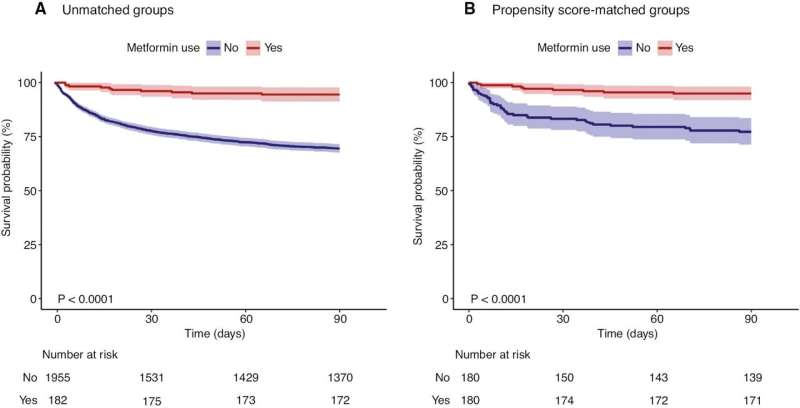Kaplan–Meier Analyses for Obtaining the Survival Curves for the Study Groups. (A) Before propensity score matching. (B) After propensity score matching. HR, hazard ratio. Credit: Cardiovascular Innovations and Applications (2023). DOI: 10.15212/CVIA.2023.0042
Patients receiving intensive care often have diabetes mellitus (DM) together with chronic heart failure (CHF). In these patients, the use of metformin in intensive care is controversial. This study was aimed at assessing the mortality rates of patients with DM and CHF treated with metformin.
The Medical Information Mart for Intensive Care database was used to identify patients with type 2 diabetes mellitus (T2DM) and CHF. A 90-day mortality comparison was conducted between patients who were and were not administered metformin. Propensity score matching analysis and multivariable Cox proportional hazard regression were used to ensure the robustness of the results.
A total of 2,153 patients (180 receiving metformin and 1,973 not receiving metformin) with T2DM and CHF were included in the study. The 90-day mortality rates were 30.5% (601/1,971) and 5.5% (10/182) in the non-metformin and metformin groups, respectively. In the propensity score matching analyses, metformin use was associated with a 71% lower 90-day mortality (hazard ratio, 0.29; 95% confidence interval, 0.14–0.59; P < 0.001). The results were insensitive to change when sensitivity analyses were performed.
The researchers conclude that metformin treatment may decrease the mortality risk in critically ill patients with T2DM and CHF in the intensive care unit.
The study is published in the journal Cardiovascular Innovations and Applications.
More information: Qiao Guo et al, Metformin Treatment is Associated with Mortality in Patients with Type 2 Diabetes and Chronic Heart Failure in the Intensive Care Unit: A Retrospective Cohort Study, Cardiovascular Innovations and Applications (2023). DOI: 10.15212/CVIA.2023.0042
Provided by Compuscript Ltd
























